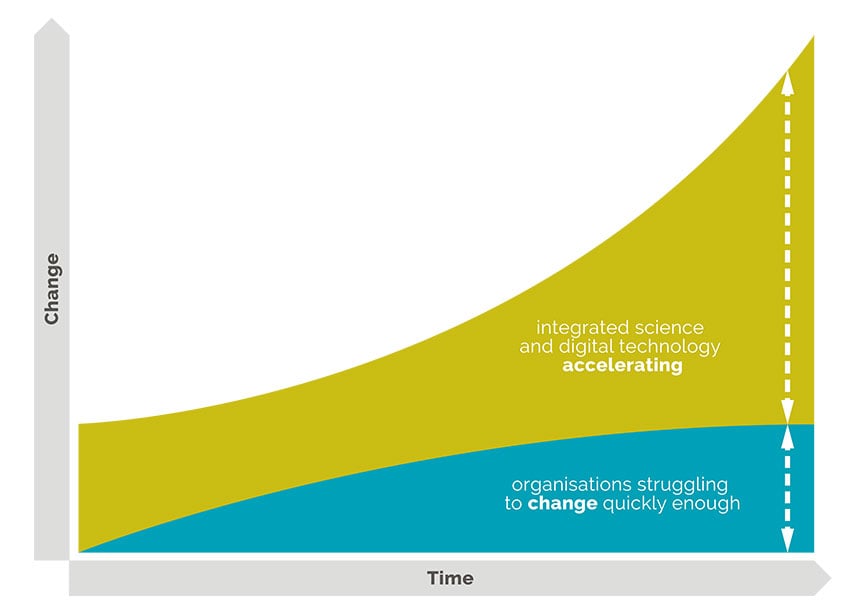Historically organisations were regarded as mechanistic; they functioned as machines, controlled through hierarchies with success measured narrowly - usually only in numbers (output, financial returns etc.). The learning system supporting such organisations was also mechanistic. Efficiency in learning, mirroring efficiency in cost, leading to the instrumentalising of learning, reducing it to the narrow demands of a highly specific job or series of tasks. We created markets in learning to serve our market economy. The economic imperatives demanded labour efficiency, so work was routinized, highly controlled and increasingly specialised. We can still recognise this world today in many organisations, despite the imperatives for change. We also see many of our educational institutions continue to serve this model, training our future labour force for a labour market that increasingly no longer exists.
Accelerating technological change
One of the powerful implications of accelerating technology is that all work in organisations and in society that can be reduced to a flowchart will be easily and readily replaced by Artificial Intelligence and associated derivatives. The implications of the substitution of people with technology are profound and challenging both to our economic orthodoxies and our social order.
All organisations need to respond to the challenges and opportunities of accelerating technologies. A traditional hierarchical model of organisational design is not up to the job of providing the agility and flexibility that the 21st century demands. All organisations therefore are in a transition, moving from being controlled by hierarchies to being enabled through networks of different kinds and different densities.
More broadly, we are also in a transition from classic organisational approaches to a market economy. Historically, economic value has been rooted in scarcity — thinking and competitive practice was based on time-honoured managerial approaches for efficiency and cost reduction.
We are now moving towards a world of increasing abundance where technology is reducing costs exponentially across a range of sectors, products and services and will continue to do so if we believe in the so-called Law of Accelerating returns.
In this context, organisations are creating value from human creativity and associated innovation and commercial success is based on networks, relationships and connectivity.
Complex problems
The nature and pace of this transition, driven by technology, is creating a context where organisations are subject to constant change to which they must respond. The VUCA (Volatile, Uncertain, Complex and Ambiguous) world is full of complex and ambiguous problems. As the Cynefin framework reminds us, complex problems can’t be addressed by established methods (for example, best practice is always out of date).
It is in this context that we cannot continue to separate learning about the work from actually doing the work. In a deep and deepening sense, learning is the work. There is simply no time to design learning solutions to today’s problems; by the time they are implemented they are out of date. We must learn while we work. Learning, especially digital learning, must be integral to the work because the work is learning.
A compelling need for innovative L&D practice
There is an ever more compelling need to ensure that organisational learning, either informal or formal, structured or unstructured is happening as part of the everyday process of doing the work. This places pressure on formal Learning & Development practice because it demands that the process of learning design is fully informed by an understanding of the work. This includes what the work is and how it is done, how it is being changed and how it will continue to change in response the arrival of technology to the wider VUCA forces impacting on the organisation.
How we use technology to support Learning & Development to respond to the challenges created by technology is the paradox at the heart of the problem. We believe that part of the answer is to focus on the nature of the day to day work, the challenges of defining the connection between strategy and work and the value that is created by the organisation for the world.
Grahame Broadbelt is Global Head of Communication and R&D.

